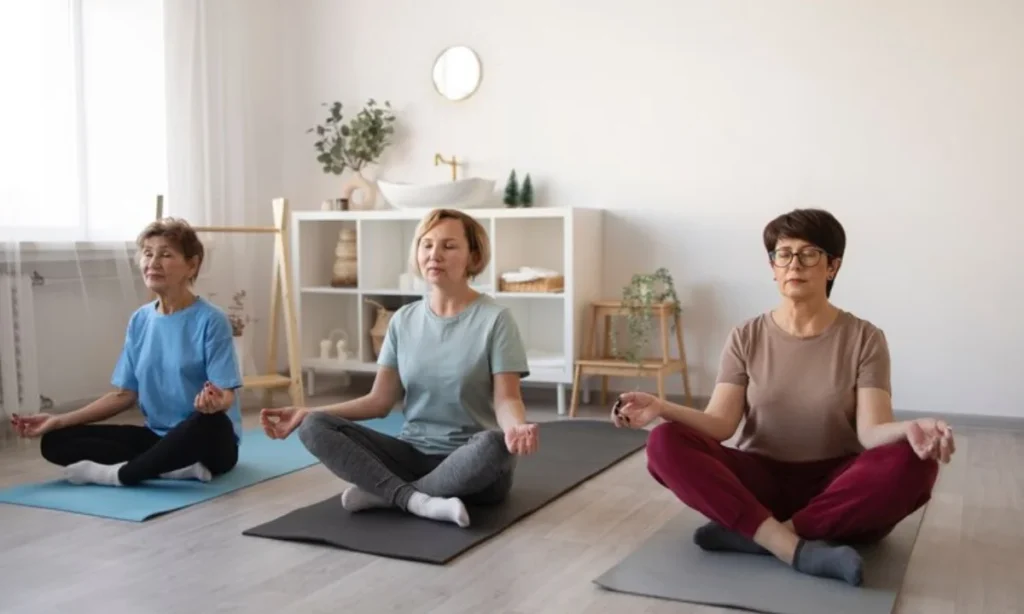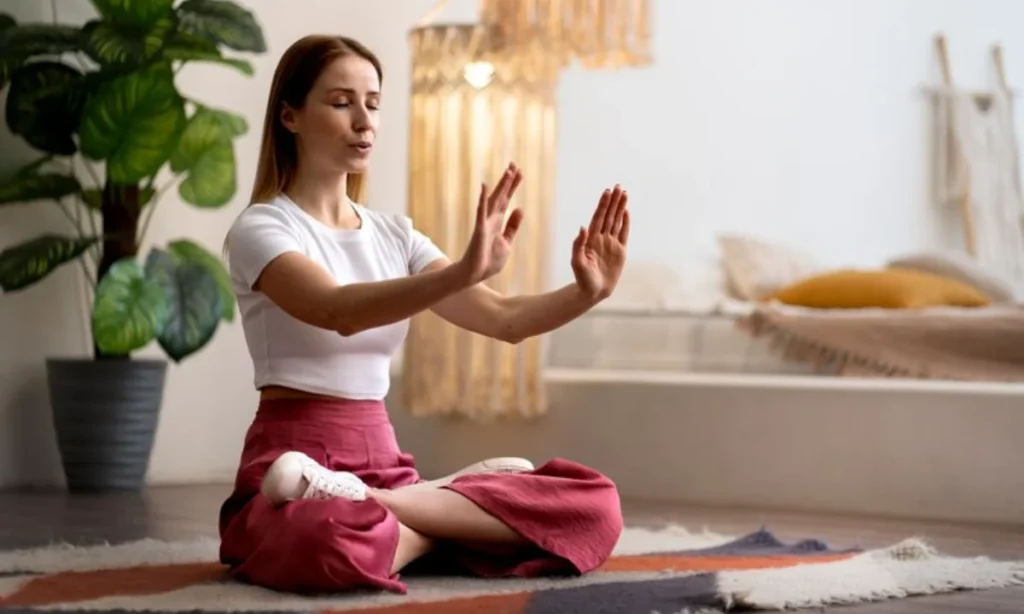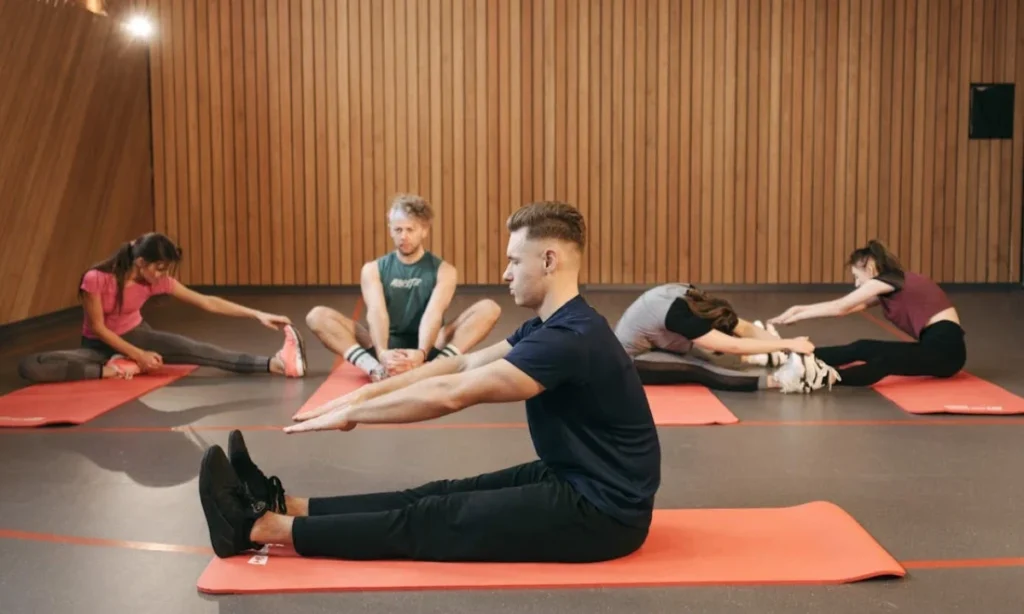How yoga improves mental health? Find out 6 essential ways to unlock calmness, improve clarity, and support mental harmony.”
A person’s emotional condition can be improved by yoga, which is particularly beneficial for mental health. Several mental health professionals and workers have finally taken notice of this more than 5,000-year physical activity and breathing technique as a helpful supplementary therapy for various psychiatric problems. The reader will be presented with scientific proof in this essay regarding the mental health benefits of yoga.
How yoga improves mental health?
Here are various ways of improving mental health by yoga:
The Mind-Body Connection

Another important concept is the concept of yoga, which considers the connection of the mind and body. It helps people to pay more attention to what they feel, think, and experience physically. The practitioners can cope with better awareness of their mental states and emotional responses. Due to this enhanced self-clinging clinging, there is likely to be an improvement in the quality of decisions made as well as an enhancement in mindfulness.
Mindfulness and Presence
Yoga encourages awareness, consciously being aware of your surroundings. This means that when people engage in the practices, they can minimize stress and anxieties arising from events that have happened in the past. Performing yoga can give a feeling of serenity and provide an escape from the rage of having to face the world daily. The studies state that the practice of yoga results not only in better control over aggression but also helps in being patient or looking at the glass as half-filled.
- How to Cancel My Planet Fitness Membership in 2025
- How many calories should I eat to lose weight?
- How many mental health professionals are in the US?
- Skin Care During Winter: 7 Essential Tips to Keep Your Skin Healthy
- How did Elon Musk lose weight so fast? 5 Secrets – You Won’t Believe What He Did!
Stress Reduction
The researcher likewise discovered that several past studies confirm that yoga aids in stress reduction. The practice also causes cortisol, the body’s stress hormone, to reduce at the same time as other mood-enhancing neurotransmitters like endorphins and GABA (gamma-aminobutyric acid) rise. Thus, when a person performs controlled breathing and physical activity, it can stimulate a parasympathetic tone and decrease the physiological arousal of stress.
Emotional Regulation
The studies reveal that yoga enhances the ability of a person to control his or her reaction to stress. One is that through instant breath control accompanied by meditation strategies, a practitioner is able to become psychologically stable to handle hardships. Such stability of emotions is significant for preventing the development of mood disorders, including depression as well as anxiety.
Cognitive Benefits
Apart from the issues of emotions, practicing yoga has a positive effect on cognitive functions. Practice exercises daily, and they associate this with improvement of vision, enhanced memory, and increased concentration levels.

Some neuroimaging studies have shown that yoga practitioners may develop structural differences in the brain that may allow for enhanced mentation, for instance, increased gray matter volume in portions of the brain involved in learning and memory.
Enhanced Mood
The effect of practicing yoga is that the brain can secrete the so-called ‘happy hormones ‘ such as serotonin and dopamine due to the physical activity involved in the practice of yoga. Postsynaptic, these neurotransmitters are important in controlling mood.
It can be used to fight off depression or even depression-like symptoms of being sluggish. These patients reveal that over time they have become happier human beings and are more satisfied with life.
Effectiveness of Yoga Mental Health Conditions
Research supports the effectiveness of yoga in addressing various mental health issues:
Depression: According to research, yoga seems to act as a good complementary treatment for persons with depression. They have also been proven to be as effective in treating similar symptoms as treating through exercises or meditation, etc. For patients who cannot tolerate antidepressants corroboration with yoga lifts the overall results.
Post-Traumatic Stress Disorder (PTSD): According to studies, yoga seems to help to reduce the severity of PTSD. Research done including women diagnosed with chronic PTSD showed positive outcomes: those who participated in trauma-sensitive yoga had their symptoms decrease; their number even fell below the PTSD diagnostic threshold in ten weeks.

Anxiety Disorders: It is found that yoga has a positive impact on GAD and OCD, where yoga can be utilized for its remedial effects. Practicing yoga reduces anxiety by helping the patients to find better ways of dealing with stress.
Conclusion
Yoga is one of the most effective techniques that embrace both the physical and the cognitive aspects of a person to enhance mental health. While more studies have emerged on how yoga can be effective for multiple mental disorders. Incorporating yoga into traditional therapy approaches can ensure improved results for those clients interested in holistic treatments.
As a tool for enhancing self-awareness, reducing stress, enhancing the capacity to regulate emotions, and enhancing cognitive clarity. Therefore, yoga appears to be a useful intervention available to people who want to improve their psychological well-being.
How does yoga help your mental health?
Yoga’s benefits include a decrease in stress levels, anxiety, and suffering from depression. Mindfulness, as well as self-awareness and the regulation of emotions, is supported. In addition, the release of brain chemicals that enhance uplifted moods and general well-being is encouraged.
How does yoga create mental calmness?
The practice of yoga makes the mind remain calm because of its mindfulness practices, remedies, controlled breathing practices that elicit relaxation, and postures that relieve tension and thus make the overall sense of the chorale’s body and mind tranquil.
How can I improve my mental health?
For better mental well-being, one should engage in physical exercise, meditation, or mindfulness. Keep connected with other people, when necessary, also get help from the specialist, and eat well and sleep well.
What is yoga therapy for mental health?
Yoga therapy for mental health constitutes exercise that is done specifically to cater to certain psychological disorders. It uses movements, breath, and mindfulness to facilitate both emotional processing and the expansion of personal consciousness and increase psychological resilience.


Excellent way to help your students.Must use some bolster for comfortable positions if need be.Relaxing shoulders, face & haw is very important. Awareness to alignment & breath is very important.Engaging belly breath & pause
mental awareness to breath deeper & deeper if possible
through nose please.
young people have lot of stress & anxiety, we must help them to improve their mental thinking.
A comprehensive overview of the profound benefits of yoga is mentioned in this article. Thank you so much for sharing